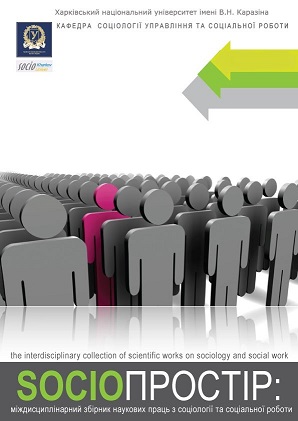STAFF WITH MENTAL PROBLEMS AS AN OBJECT OF SOCIOLOGICAL ANALYSIS
Abstract
The relevance of the article topic is justified by the need to develop effective methods and tools for staff management, as well as special techniques to work with employees who have certain mental disorders. The main task of the article is to analyze the categories of employees with mental problems from the point of view of sociology of deviant behavior and to study the consequences of the destructive influence of staff with mental disorders at different levels of interaction: «the leader and subordinate» and «colleagues in the team».In the article, the category «mental disorders» is defined as various personality disorders, as a deviating from the norm state of the human psyche. This category was analyzed from the methodological position of the sociology of deviant behavior. It has been determined that deviations from the norms caused by mental problems of the person can be considered as forms of manifestation of organizational deviations.The authors of the article define the main groups of personality disorders, investigate the behavior of individuals with such disorders and analyze the norms that are violated. Exceptional attention is paid to the study of the negative consequences that cause destructive behaviors of persons with mental disorders in the workforce. Their analysis was carried out on two levels of interaction: «leader and subordinate" and "colleagues in the team». In the traditions of classical sociology, it is concluded that the existence of organizational deviations related to the behavior of staff with personality disorders is normal. General recommendations are offered for working with employees with mental disorders in organizations. Impact management techniques should be aimed both at working with individuals with mental problems and with employees with direct professional ties to them.
Downloads
References
Рущенко І. П. Загальна соціологія: підручник. Харків : Вид-во Нац. ун-ту внутр. справ, 2004. 524 с.
Робота з персоналом організацій : навч. посіб. / за ред. І. П. Рущенка. Харків : Видавництво «Форт», 2013. 460 с.
Змановская Е. Девиантология: (Психология отклоняющегося поведения) : учеб. пособие для студ. высш. учеб. заведений. Москва : Академия, 2006. 288 с.
Клейберг Ю. Психология девиантного поведения : учеб. пособие для вузов. Москва : Сфера; Юрайт-М, 2001. 160 с.
Козлов С. Персонал: основной ресурс или основная угроза? URL: http://ekb-security.ru/portfelsb/abc/73-2010-02-08-18-46-03.html (дата звернення: 30.11.2020).
Менделевич В. Д. Клиническая и медицинская психология : практ. рук. Москва : МЕДпресс, 1998. 587 с.
МКБ-10. Классификация психических и поведенческих расстройств: Исследовательские диагностические критерии. Женева : Всемир. орг. здравоохранения, 1998. 208 с.
Святокум О. І. Типологія працівників з ментальними проблемами. Український юридичний портал «Радник». URL: http://radnuk.info/statti/573-psih/14878-2011-01-19-22-35-59.html (дата звернення 4.12.2020)
Шипилов А. Как обеспечить надежность персонала? URL: http://www.klerk.ru/boss/articles/7137. (дата звернення 1.12.2020)
Каваиола Алан А., Лавендер Нейл Дж. Ядовитые сотрудники: коллеги, которые отравляют нам жизнь. Ростов на Дону : «Феникс», 2005. 272 с.
Розпорядження Кабінету Міністрів України. Концепція розвитку охорони психічного здоров’я в Україні на період до 2030 року. URL: https://zakon.rada.gov.ua/laws/show/1018-2017-%D1%80#Text (дата звернення 25.11.2020)

